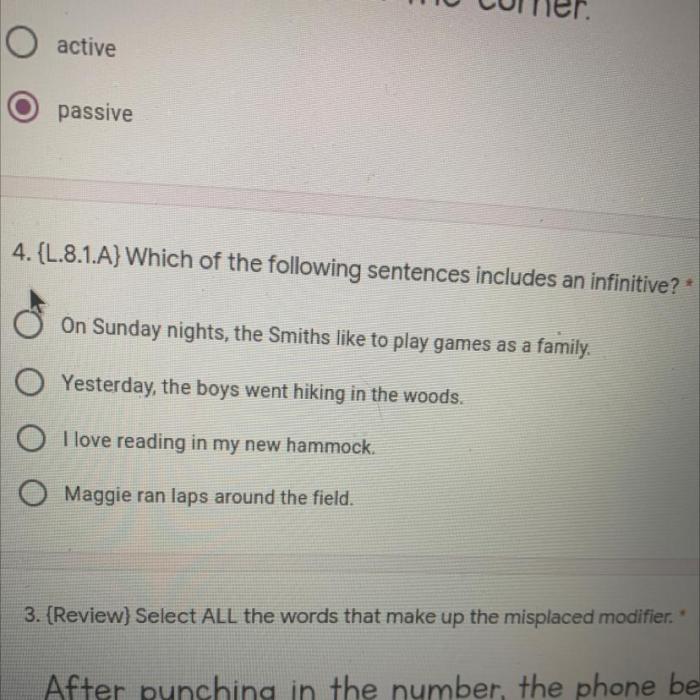Which of the following sentences contains an infinitive? This question marks the beginning of an exploration into the realm of infinitives, delving into their structure, usage, and significance within the tapestry of English grammar.
As we embark on this linguistic journey, we will unravel the mysteries of infinitives, discovering their multifaceted nature and the vital role they play in shaping the nuances of language.
Identifying Infinitives

An infinitive is a verbal form that functions as a noun, adjective, or adverb. It is typically preceded by the word “to” and can express a variety of meanings, such as purpose, possibility, or obligation.
Here are some examples of sentences with infinitives:
- I went to the store to buy groceries.
- It is important to eat healthy.
- She is too tired to go out.
Infinitives have a specific structure. They consist of the infinitive marker “to” followed by the base form of the verb. For example, in the sentence “I went to the store to buy groceries,” the infinitive is “to buy.” The infinitive marker “to” indicates that the verb “buy” is being used as a noun.
There are three types of infinitives: plain infinitives, perfect infinitives, and progressive infinitives. Plain infinitives are the most common type and are used to express simple actions or states of being. Perfect infinitives are used to express actions or states of being that have already occurred.
Progressive infinitives are used to express actions or states of being that are currently in progress.
Analyzing Sentence Structure, Which of the following sentences contains an infinitive
| Sentence | Verb | Infinitive | Explanation |
|---|---|---|---|
| I went to the store to buy groceries. | went | to buy | The infinitive “to buy” is used as a noun to express the purpose of going to the store. |
| It is important to eat healthy. | is | to eat | The infinitive “to eat” is used as an adjective to modify the noun “healthy.” |
| She is too tired to go out. | is | to go | The infinitive “to go” is used as an adverb to modify the verb “is.” |
Exploring Infinitive Usage
Infinitives can be used in a variety of ways to modify other words in a sentence. They can be used as nouns, adjectives, or adverbs.
As nouns, infinitives can function as the subject, object, or complement of a sentence. For example, in the sentence “To err is human,” the infinitive “to err” is the subject of the sentence. In the sentence “I want to go to the store,” the infinitive “to go” is the object of the verb “want.”
In the sentence “She is too tired to go out,” the infinitive “to go” is the complement of the verb “is.”
As adjectives, infinitives can modify nouns or pronouns. For example, in the sentence “It is important to eat healthy,” the infinitive “to eat” modifies the noun “healthy.” In the sentence “She is too tired to go out,” the infinitive “to go” modifies the pronoun “she.”
As adverbs, infinitives can modify verbs, adjectives, or other adverbs. For example, in the sentence “She is too tired to go out,” the infinitive “to go” modifies the verb “is.” In the sentence “It is important to eat healthy,” the infinitive “to eat” modifies the adjective “healthy.”
In the sentence “She walked quickly to the store,” the infinitive “to go” modifies the adverb “quickly.”
Infinitives can also be used to create infinitive phrases. An infinitive phrase is a group of words that consists of an infinitive and its modifiers. For example, in the sentence “I want to go to the store,” the infinitive phrase is “to go to the store.”
Infinitive phrases can function as nouns, adjectives, or adverbs.
Identifying Sentences with Infinitives
There are a few simple rules that can be used to identify sentences that contain infinitives.
- Look for the word “to” followed by the base form of a verb.
- Determine if the word “to” is being used as an infinitive marker or as a preposition.
- If the word “to” is being used as an infinitive marker, then the sentence contains an infinitive.
Here are some examples of sentences that contain infinitives:
- I went to the store to buy groceries.
- It is important to eat healthy.
- She is too tired to go out.
- I want to go to the store.
- She walked quickly to the store.
The following table summarizes the rules and examples for identifying sentences with infinitives:
| Rule | Example |
|---|---|
| Look for the word “to” followed by the base form of a verb. | I went to the store to buy groceries. |
| Determine if the word “to” is being used as an infinitive marker or as a preposition. | It is important to eat healthy. |
| If the word “to” is being used as an infinitive marker, then the sentence contains an infinitive. | She is too tired to go out. |
Essential Questionnaire: Which Of The Following Sentences Contains An Infinitive
What is an infinitive?
An infinitive is a verb form that functions as a noun, adjective, or adverb. It typically begins with the word “to” and can express a variety of meanings and grammatical functions.
How can I identify an infinitive in a sentence?
Look for a verb form preceded by the word “to” that is not followed by a direct object. This indicates that the verb is in infinitive form.
What are the different types of infinitives?
There are three main types of infinitives: the plain infinitive (e.g., “to walk”), the present participle (e.g., “walking”), and the past participle (e.g., “walked”).

